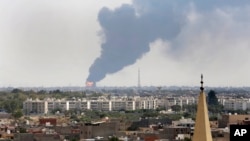A fire continued to rage out of control Tuesday at an oil depot that supplies Libya's airport in the capital Tripoli, officials said.
The fuel storage tanks were struck on Monday in the crossfire of warring militias battling for control of the airfield, the latest violence to plague the country.
Libya's interim government said in a statement that the fire could trigger a "humanitarian and environmental disaster" in Tripoli, and appealed for "international help" to extinguish the inferno.
The blaze spread to a second depot on Monday afternoon, the government said.
It was unclear if there were any injuries from the fire.
Deadliest violence
Libya has descended into its deadliest violence since the 2011 war that ousted Moammer Gadhafi, with the central government unable to impose order amid a climate of political and security instability that is affecting citizen's access to necessities.
Most gas stations in Tripoli have been closed since fighting erupted between rival militias fighting for control of the Libyan capital's airport.
Hundreds of cars have been left for days in huge lines at different petrol stations waiting for fuel, Reuters reported.
“The holidays are here and people want to enjoy Eid, but they can not. They want to go out and shop for Eid, but they don't have one drop of petrol,” Mohammed Algiriani, a Tripoli resident told Reuters on Saturday.
Monday marked the start of Eid al-Fitr in Libya and across much of the Muslim world.
The holiday is Islam's biggest annual celebration at the end of the fasting month of Ramadan, celebrated with large family gatherings around traditional food and special desserts, family outings and wearing new clothes.
But in Libya, many families have been unable to enjoy Eid this year.
At least 36 people were killed in Libya's eastern city of Benghazi where Libyan Special Forces and Islamist militants clashed on Saturday night and Sunday morning, medical and security sources said.
The government said more than 150 people died, many of them civilian, in the capital Tripoli and Benghazi in two weeks of fighting as clashes forced U.S. and foreign diplomats to pull out of the country.
The National Oil Corporation (NOC) in Libya said in a statement the gasoline crisis was mainly a security problem and was not caused by a lack of supplies.
Marwan, a Tunisian worker at Abustah Gas Station in Tripoli, said there was enough petrol.
“Petrol is available, but it is the way citizens are dealing with it. When people fill their cars, they fill up for four, five, six or seven days,” he said.
“Let the crisis pass because there is petrol. Libya is the world's third largest producer of petrol, so how is it possible not to have petrol? If it is short on petrol, then it is because of someone's creation,” Marwan added.
Security groups
Libya's fragile government, with no strong standing army of its own and hamstrung by political infighting, is struggling to impose order on the vast North African OPEC oil producer whose turmoil threatens to spill over its borders.
In Tripoli, the government has sanctioned civil defense units to stand in for protecting citizens.
The “Joint Security Room” is one such group.
“We provide protection without any problems. The force protecting the station can come, but there will be gun fire, you know it is not a secret everyone has bullets at home and we don't want anyone to get killed at the station. Some people sabotage the process by breaking the fuel pipes, blocking the barrels or breaking their gas meters,” a member of the group who refused to identify himself said.
Meanwhile, Libya's oil production fell last week, eroding increases since April in revenue for the state after officials managed to negotiate an end to a blockade of vital oil ports.
A spokesman for the National Oil Corporation said production July 21 had been at 450,000 barrels per day down from 555,000 bpd a few days earlier, partly because El-Feel oilfield had reduced output due to the clashes in Tripoli.
Some information for this report provided by Reuters and AP.












